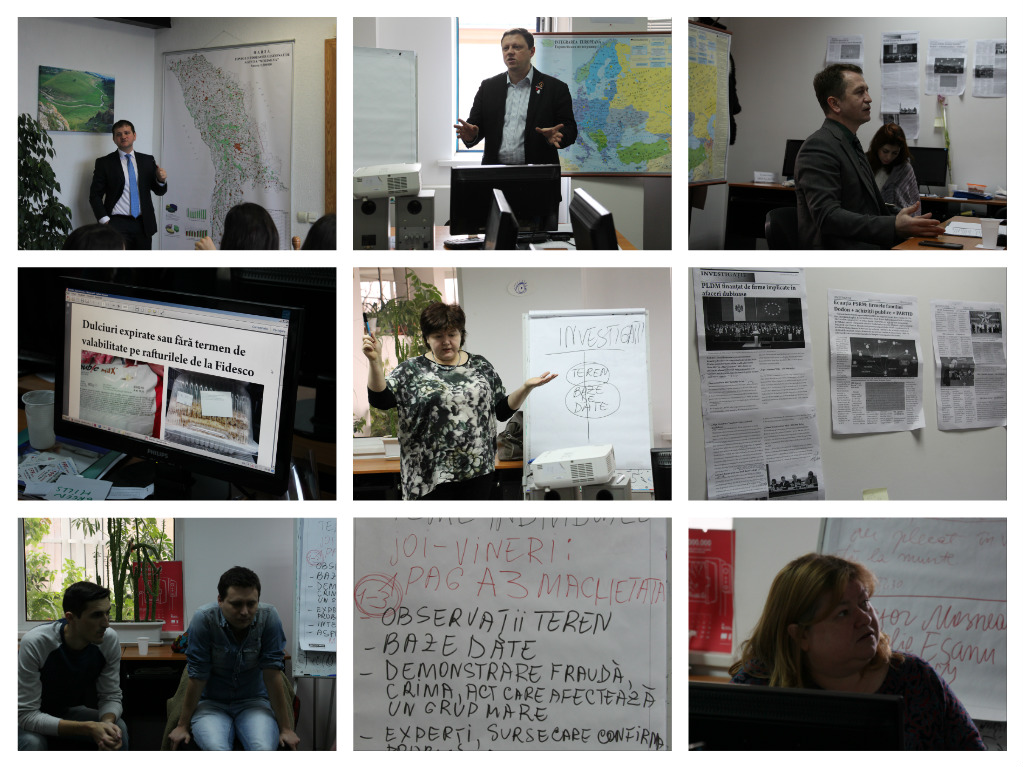Investigative journalism, a course teaching to discover hidden truths

The end of March at the School of Advanced Journalism was marked by the end of one of the most complex courses – Investigative Journalism. For three weeks, students had been working at identifying issues of public interest, learning about research strategies, doing confrontation interviews and fieldwork, and writing their own journalistic investigations. In doing journalistic investigations, they were guided by trainer Alina Radu, director of “Ziarul de Gardă” newspaper.
The course began with several practical exercises. The first exercise dealt with “violations in the supermarkets of Chisinau.” Students were divided into teams and went to various supermarkets in order to find and register possible violations at trade outlets, such as expired goods or incorrect storage. After collecting the necessary information, students arranged it as a newspaper page in size A4.
“Funding of political parties during the elections campaign of November 2014” was the topic of the second practical exercise. Students were divided into six teams, and each team got the task to carefully study databases and information on parties’ online platforms. Having found errors in the figures and information that they received, students appealed to sources, asked confrontation questions, and arranged articles in a newspaper page in size A3.
The third task, which was also the most difficult, required students to make their own journalistic investigations. This year young people again preferred social topics. Liliana Croitor tried to find violations in the Chisinau-Puhoi transport route; Stela Boico wrote about the quality of water consumed in Chisinau; Olimpia Begleta made an investigation about the “Cemetery of Heroes,” which had lost its status of historic monument nine years ago, having been sold for 70 million lei. Student Iurii Botnarenco found out who is behind businesses with illegal deforestation; Natalia Ghetu narrated about in vitro fertilization, which has become a profitable business in Moldova; Irina Gusan investigated the case of some filling stations in the capital that had been built without authorization; Elena Furdui reported about a military man involved in the accident that occurred a while ago in the Ciocana district of Chisinau and resulted in the death of one person; and Lia Ciutac explained why every citizen is responsible for the ecological catastrophe on the river Bic. Veronica Tabureanu wanted to know why some judges that had obtained smaller scores than other candidates were still appointed to their positions by the Superior Council of Magistracy. Some of them, Veronica writes, were also involved in various dubious businesses. Finally, Anastasia Pojoga investigated faults in the property statements of Moldovan MPs.
During the three weeks of the course, SAJ students met several relevant experts. Pavel Postica, director of the Monitoring Democratic Processes Program in Promo-LEX Association, told students where political parties get money. With Dorin Purice, head of the Border Police, they discussed about security at the state border, contraband, visa-free travel, and reforms. Also, in the first days of the course, students had a documentation visit to the Ministry of Environment, where they met Minister Valeriu Munteanu. They discussed about illegal fishing, illegal hunting, deforestation, and situation of the river Bic.
To encourage students to do investigations and to let them have a “firsthand” glance into the work of an investigative reporter, the trainer invited Victor Mosneag and Anatolie Esanu, reporters for “Ziarul de Gardă” newspaper. The two journalists told students about the importance of investigations for society and about their professional experience. “The work of an investigative reporter seems interesting and captivating, but it is also dangerous,” the guests mentioned.
SAJ students found the course quite difficult, but very interesting. “Investigative journalism is a course that makes you think critically, but not just anybody can do it,” student Ecaterina Mihalachi thinks.
Irina Gusan says that attention to detail is essential in doing a journalistic investigation. “I tried paying attention to detail, asking myself questions about what is behind some actions, and persevering in finding answers. The documentation exercise helped me realize the interviewee’s intention to lead me on a wrong track. It was an experience that on the one hand saddened me, but on the other hand it showed me what you can gain if you are well-informed,” Irina said.
In her turn, student Opimpia Begleta recognized that doing her own journalistic investigation was a real challenge. Still, “…by doing fieldwork, discussing with different sources, and designing materials we obtained some skills that will be of use in the future,” Olimpia concluded.
